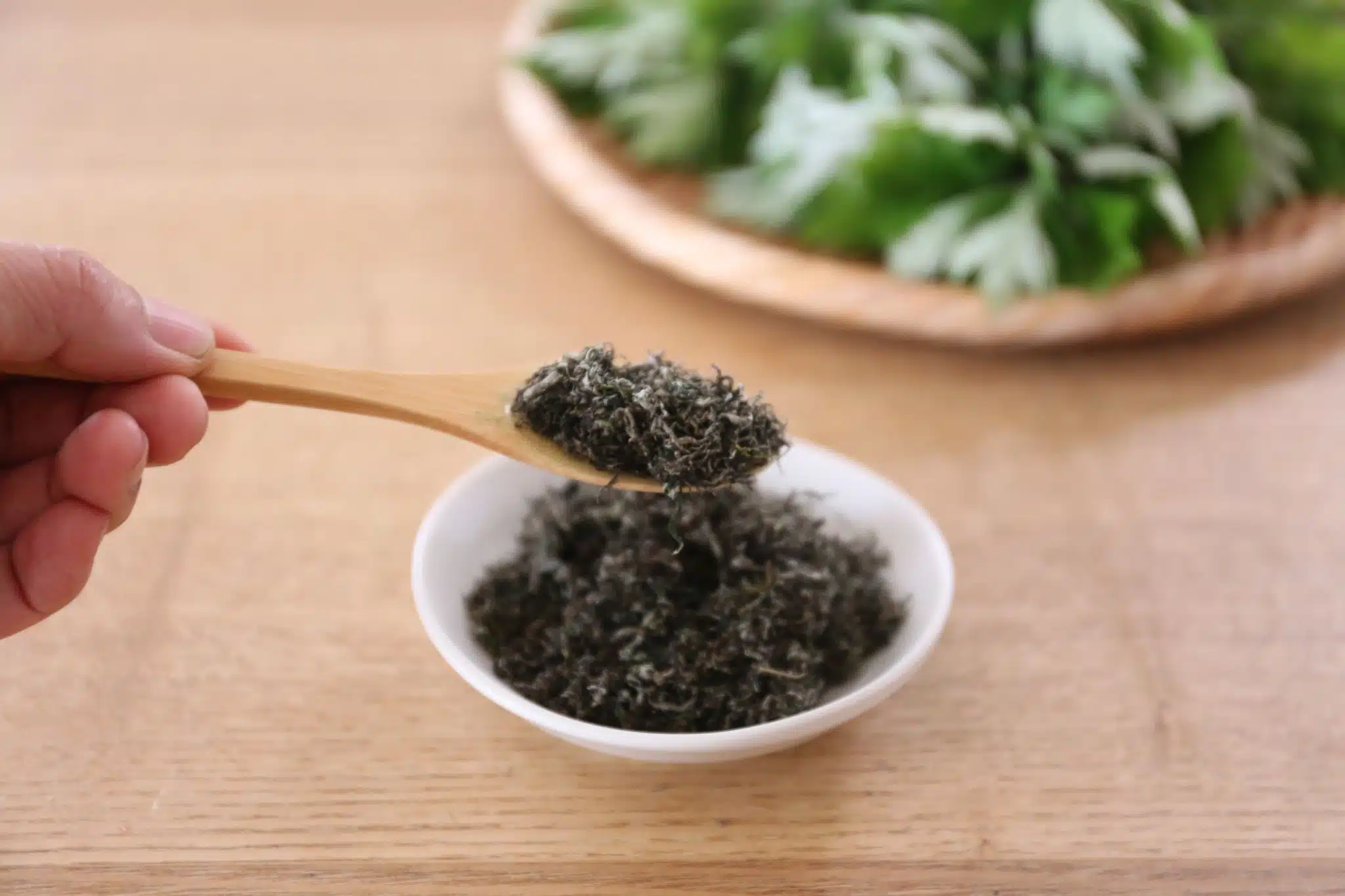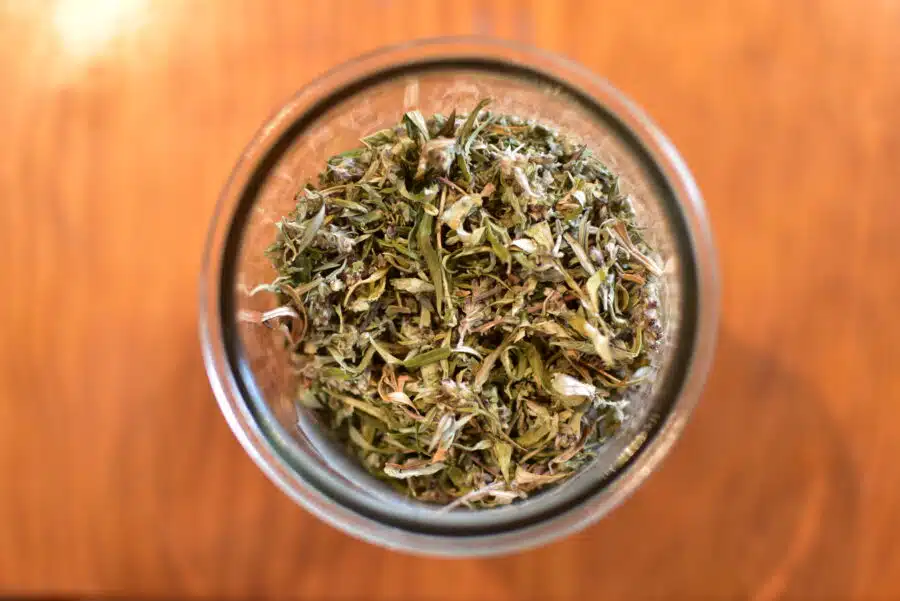Mugwort is one of the most beautiful herbs that you can grow in your garden.
This herb grows wild over a wide area, but it can also be grown indoors -especially when propagated through cuttings.
Its strong, pungent aroma and flavor, as well as its ability to resist pests, has made mugwort one of the most popular herbs for culinary use.
It’s one of the few plants you can plant without having to worry about predators or insects; all it needs are some good drainage and a bit of sunlight.
Mugwort is mostly used in the food industry for flavoring condiments, but for millennia it was also used for medicinal purposes.
If you want to experience the beneficial benefits of this herb, you should be able to brew a mugwort tea.
What ingredients are needed to make mugwort tea ?

To brew a mugwort tea, you will need three ingredients: mugwort, water, and a small amount of sugar at the end.
Mugwort (Artemisia vulgaris) grows in the wild only in areas with a temperate climate, but it is not difficult to grow at home.
In fact, it is an excellent choice for indoor gardening because it is drought-resistant.
And if you want to try growing it from cuttings, this article is your ideal guide.
How long should mugwort tea be steeped for ?
Mugwort tea should be brewed for two to six hours.
If you want the best taste and aroma, you should steep it for more than four hours.
Stir your mugwort tea once in a while to keep the water clear.
If your mugwort tea gets cloudy , then you can strain out the leaves before serving or storing it in a clean jar with a lid to keep it fresh longer.
You will know that your mugwort tea is done when it smells like sage.
It’s also not advisable to add milk because milk may make the flavor too strong.
What are the health benefits of drinking mugwort tea ?
There are many health benefits of drinking mugwort tea.
Here are a few of them:
1. Drinking mugwort tea can help you fight infections
Many herbal teas are antimicrobial and antibacterial.
Mugwort tea , however, is particularly effective in fighting infections.
It has antimicrobial and cleansing properties, which will help you prevent infection while detoxifying your body .
Mugwort tea can help you fight infections by killing bacteria, reducing the bad bacteria that causes an imbalance in the gut flora, and by providing antioxidants to support the immune system.
2. Mugwort reduces inflammation
Inflammation is a symptom of many diseases and conditions.
Inflammation takes place when cells release excessive proteins into the bloodstream, which then travels through the bloodstream to organs where it can cause irritation.
Inflammation can also lead to pain and discomfort.
Inflammation is usually caused by environmental factors like toxins, poor diet, stress, or bad bacteria.
You can reduce inflammation by avoiding inflammatory foods like processed red meat and sugar-rich foods.
One of the main ingredients in mugwort tea is an herb called ginger that contains a compound called Zingiber officinale, which is considered a powerful anti-inflammatory.
3. Mugwort improves digestion
Mugwort contains substances called volatile oils that are known for improving digestion.
In fact, there’s a compound found in mugwort that is so effective at calming digestive issues that it’s often prescribed as an antibiotic drug.
“When you drink mugwort tea with milk or honey in the evening before going to bed it relaxes your stomach muscles and moves the food down through your digestive tract,” says Teagasc’s Food Nutrition Unit.
4. Mugwort tea can help you lose weight
“Mugwort tea has been used for centuries as an appetite suppressant,” says Teagasc’s Food Nutrition Unit.
“Drinking mugwort tea just before dinner will help to keep off those extra pounds and break cravings for the unhealthy foods…it also tastes good !”
What is the best way to store mugwort tea ?

Like any herb , you need to store mugwort tea properly to ensure that you keep the colors bright, the taste fresh and the nutrients intact.
You can store your mugwort tea in a cool, dark place for no longer than six weeks.
Mugwort tea also keeps best when it’s refrigerated or frozen.
If you prefer to keep your tea in the fridge, you don’t need to place it in a glass or ceramic container; just make sure it is tightly closed .
Mugwort tea will keep for several months at room temperature if you choose to freeze it.
What should be added to mugwort tea to make it more palatable ?
There are two main ways for tea to get more palatable and tastier.
The first way is by adding fruit, herbs, spices , or other ingredients to the tea .
The second way is by adding a sweetener to it.
If you want to add more taste to your mugwort tea , the best way would be to add some fruit or other ingredients to it.
If you have one fruit in mind, you could simply cut the fruit into small pieces and add it to the tea.
It’s best not to use a whole fruit though, as the flavor might be too overwhelming .
Another idea is to use a spice that’s a bit reminiscent of the flavor of fruits or vegetables.
For example , you can use rose petals, or you can infuse your mugwort tea with mint leaves .
How can mugwort tea be used medicinally ?
Mugwort is a natural herbal remedy used to boost the immune system, promote good digestion , and support overall health.
It has shown to have a positive effect on many different health conditions, such as cancer, diabetes, and inflammation .
Mugwort tea is also a great alternative to other teas.
It’s healthy, tasty , and contains many beneficial vitamins and minerals .
This article will help you learn about mugwort tea recipes , how to brew them correctly, as well as the benefits associated with drinking this beverage .
You’ll also find out some of the side effects of consuming mugwort tea if you choose to include it in your diet.
Are there any side effects associated with drinking mugwort tea ?
Mugwort is known to have a very strong and pungent flavor that can leave a person with a bit of a burning sensation in their mouth after drinking it.
This is because the herb contains the essential oil thujone , which is chemically related to henbane .
This is why you can’t just drink mugwort tea for the sake of health, but you should also take a break from it soon after starting, especially if you’re sensitive to thujone.
If you are not sensitive to thujone and still want to use mugwort for health benefits , sip your mugwort tea slowly and only have small glasses.
Otherwise the strong flavor may overwhelm your taste buds.
There are also other harmful effects that can come from mugwort tea.
Regular consumption of mugwort can cause liver damage and kidney problems (because mugwort contains oxalates).
It’s also said to be an abortifacient , which means it can cause miscarriage .
On the other hand, mugwort has some properties that make it an ideal plant for medicinal purposes .
For example , mugwort is known to ease digestion problems caused by eating too much meat or by consuming refined foods.
Mugwort tea also increases your body’s immunity and helps boost your body’s ability to fight off infections and bacteria.
What other herbs can be used in combination with mugwort tea ?
The many wonderful benefits of mugwort are due to its unique chemical composition.
These benefits include a high vitamin C content, which is helpful for building and maintaining a healthy immune system, stimulating digestive enzymes, and increasing the absorption of minerals.
However, it also has some potent anti-inflammatory properties.
This means the herb can help to reduce inflammation in the body caused by a wide variety of conditions, ranging from allergies to arthritis.
Other herbs that you can use with mugwort tea include catnip, peppermint, lemon balm , mint and sage.

How can the flavor of mugwort tea be enhanced?
Like any herbal tea , mugwort tea has a subtle taste that can be improved with the right spices.
If you are looking for new ways to use mugwort and make it more interesting, you will soon find that there are plenty of ways to spice up your mugwort tea.
Is it safe for pregnant women to drink mugwort tea?
Aside from being a powerful antibacterial, mugwort also has some positive effects on the health of your unborn baby .
Both the herb and its extracts have shown to be safe for pregnant women to consume , unlike some other herbs that are known to cause birth defects.
It can be used in herbal teas when making colic tea; while it may not be suitable for the whole body , it’s extremely healthy for your baby’s digestive system .
It also aids in protecting your baby from infections and is known to relieve gas pains.
If you’re pregnant and want to get healthy and help with the delivery of your baby, add some mugwort tea to your diet.

Ingredients
- 2 parts Mugwort Artemesia vulgaris
- 2 parts Blue lotus flower petals Nymphaea caerulea
- 1 part Passionflower Passiflora incarnata
- 1 part Ginkgo leaf Ginkgo biloba
- ½ part Dried orange peel
Instructions
- In a bowl, mix all the herbs together.
- Label and date after transferring to a fresh glass jar.
- Pour one cup of boiling water over one teaspoon of this mixture, soak for five minutes, and cover the pot to keep the volatile oils in.
- Into a tea cup, strain.
- Drink some tea in the evening to prepare for nighttime astral travel.
